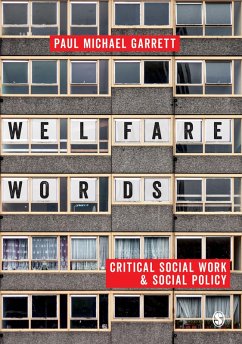'Systematically exposes the neoliberal myths in unequal societies' - Niels Rosendal Jensen
'A call to arms to challenge inequality and social exclusion.' - Lel Meleyal
'An impassioned dissection of the highly coded lexicon of so-called welfare reform...get reading, get angry, get ready'. - Gargi Bhattacharyya
Welfare Words analyses the keywords and phrases commonly used by policy-makers, news-outlets and wider society, when referring to social policy, welfare reform and social work in the present-day culture of neoliberal capitalism. Examining how power relations operate through language and culture, it encourages readers to question how welfare words fit within a wider economic and cultural context riven with gross social inequalities; to disrupt taken-for-granted meanings within mainstream social work and social policy, and to think more deeply, critically and politically about the incessant usage of specific words and phrases. Written by an authoritative voice in the field, Paul Michael Garrett makes sense of complex theories which codify everyday experience, giving readers vital tools to better understand and change their social worlds.
'A call to arms to challenge inequality and social exclusion.' - Lel Meleyal
'An impassioned dissection of the highly coded lexicon of so-called welfare reform...get reading, get angry, get ready'. - Gargi Bhattacharyya
Welfare Words analyses the keywords and phrases commonly used by policy-makers, news-outlets and wider society, when referring to social policy, welfare reform and social work in the present-day culture of neoliberal capitalism. Examining how power relations operate through language and culture, it encourages readers to question how welfare words fit within a wider economic and cultural context riven with gross social inequalities; to disrupt taken-for-granted meanings within mainstream social work and social policy, and to think more deeply, critically and politically about the incessant usage of specific words and phrases. Written by an authoritative voice in the field, Paul Michael Garrett makes sense of complex theories which codify everyday experience, giving readers vital tools to better understand and change their social worlds.
Dieser Download kann aus rechtlichen Gründen nur mit Rechnungsadresse in A, D ausgeliefert werden.
What I found most striking about this book was the way Garrett shows the changing meanings of keywords over time and in relation to wider social developments. Many terms now used to maintain a neoliberal agenda and societal status quo, often had more progressive and, often, revolutionary meaning behind them. Such an insight should alert us to the need not to take any term at face value but interrogate it in order to discover what it signifies at any historical juncture and particular social context. Garrett has provided us with a valuable analysis of the language of welfare and of the political uses and misuses of keywords that are ubiquitous within the field of social welfare, social policy, social work and the wider public. I highly recommend it for all levels of study within such disciplines as well as those of politics, sociology, media and cultural studies. It is also required reading for academics and politically engaged members of the public, indeed anyone with an interest in, understanding contemporary society. Kenneth McLaughlin, Journal of Political Power









